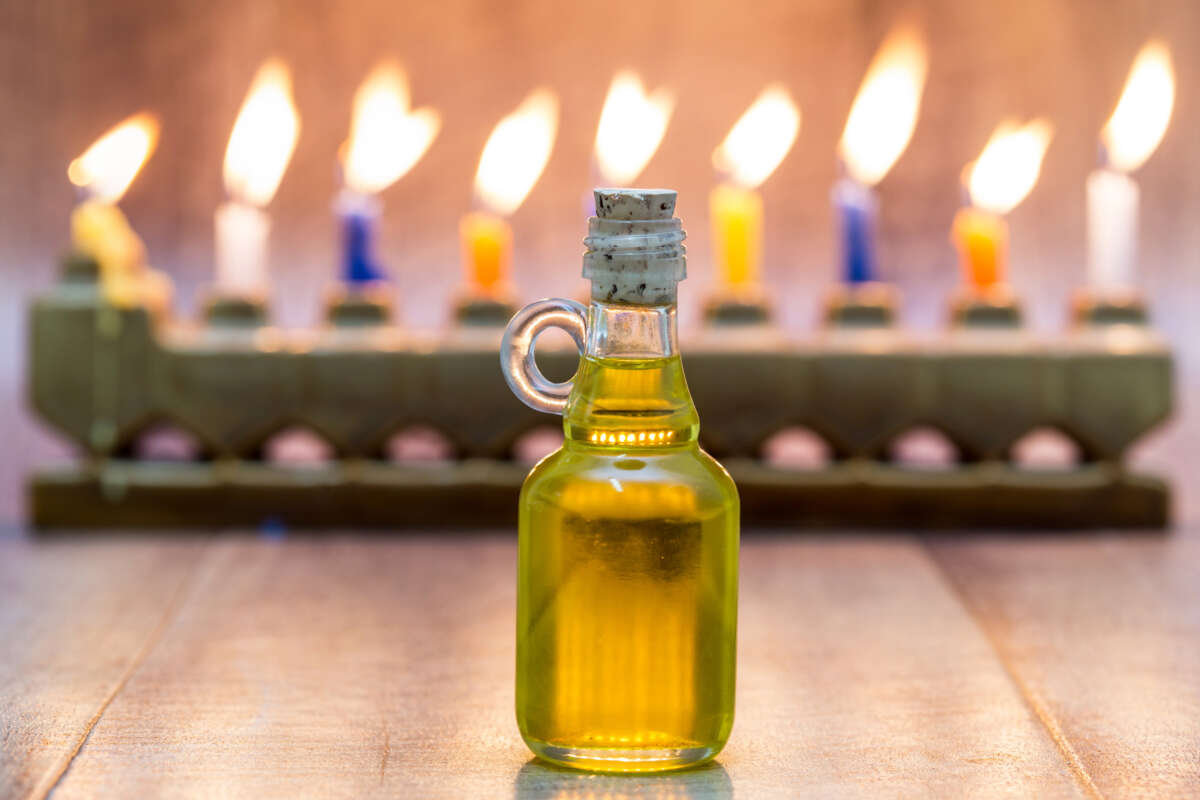Did you know that Truthout is a nonprofit and independently funded by readers like you? If you value what we do, please support our work with a donation.
I love the long nights of this time of year. I can feel Hanukkah coming. We will eat sweet and savory potato pancakes and jelly donuts. Each night, as the sun sets a little earlier, we will kindle one more candle on the menorah and watch the flames reflected in the windowpane.
As the candles burn, it will be time to play dreidel. This is my 4-year-old’s favorite part: spinning the top and eating chocolates encased in golden foil. This year, she will finally be old enough to learn the story that is encoded in the squat Hebrew letters engraved on each side of the dreidel: A Great Miracle Happened There. But what miracle of Hanukkah should I teach her?
You would think there is a straightforward answer to this question. After all, there is a historical record of the Hanukkah story. In 167 BCE in occupied Jerusalem, there was a Jewish uprising against the repression of the Hellenist Seleucid Empire led by a group of rebels known as the Maccabees (literally the “hammers”). Miraculously, the ragtag group of radicals won against one of the largest empires the world has ever seen. This is the miracle that dominates modern retellings of Hanukkah: the marvel of resistance.
There is more to the story. The Maccabees won the battle, but they lost the war. The next few attempted rebellions were failures that led to needless bloodshed. For the next 2,000 years plus, Judaism existed without land. The rabbis who led the Jewish people in the diaspora were not eager to encourage more armed revolts. Instead, Judaism became anti-nationalist, pacifist and anti-military. Rather than meeting in one geographical location — Jerusalem — we connected through stories and debates throughout the generations and around the world.
The Book of Maccabees, which tells the story of the rebellion, became a holy text in Catholic and Eastern Orthodox Christian traditions, but it’s never been a Jewish sacred text. Instead, in Jewish holy books and prayers the rabbis spun a tale of a very different kind of miracle. To rededicate the Temple, the people needed to burn the menorah for eight nights, but they only had enough oil for one night. Miraculously, the oil lasted all eight dazzling nights.
It was only with the rise of Zionism in the 19th century that the Maccabees were revived as Jewish heroes. At the second Zionist congress in 1898, Max Nordau urged the shaping of a new “muscular Jewry,” to master the Land of Israel. The Maccabees were lifted up as the prototypes of the new Jews and the Maccabee Games, an all-Jewish athletics tournament, were created to celebrate this new Jewish masculinity.
Despite this troubling history, today Jewish and non-Jewish leftists alike tend to prefer the story of the Maccabees to the original Jewish miracle of the oil (or offer a newly minted joint tale). A military rebellion is a vivid masculine melodrama. Stretching your oil is a domestic success, almost a measuring error. In the minds of the early Zionists, the oil was linked to the passive effete character of diaspora Jewry. In other words, the miracle of the oil was rejected by Zionism, because of the miracle’s implicit queerness and femininity, as opposed to the toxic masculinity of the Maccabees. This bias is alive and well in contemporary activist culture, even if we are not always aware of it.
The oil is an intentionally quiet miracle. It is about discovering that we can get by with less. In a time of climate disruptions, when we literally need to burn less oil, it is a powerful anti-consumerist reminder that perhaps we already have enough. The rabbis’ decision to celebrate the miracle of using less oil, instead of the battle, has poignant resonance in our modern geopolitical reality, when so much blood is shed to hoard oil.
On a metaphoric level, as a chronically ill person, I often feel like I don’t have enough symbolic oil to get through the long nights of winter. The miracle of the oil is a way to remember that slowly burning just a little of my own fuel, as an activist and as a parent, allows me to sustain myself in the face of an ableist world that demands that we constantly produce.
The landscape of Zionism so dominates contemporary Jewish life that it’s easy to forget that for most of our history, Judaism was not concerned with nation building at all. The Book of Maccabees preserved the record of the battle as a holy text for Christians, but traditional Jewish sacred texts for Hanukkah offer exactly the opposite message. Every year on the shabbat of Hanukkah we read in synagogue from the Book of Zechariah: “Not by might, nor by power, but by My spirit.”
I know what miracle I will be teaching my child as the candles burn. The diaspora is a miracle. Jewish people found ways of living and loving for thousands of years without land or army; we found home in stories and questions. The long nights of this season are to be cherished as a precious time to do less, burn less oil and be together more.
Note: A previous version of this article stated that the 167 BCE uprising took place against the Roman Empire. That has been corrected to the Hellenist Seleucid Empire.
Media that fights fascism
Truthout is funded almost entirely by readers — that’s why we can speak truth to power and cut against the mainstream narrative. But independent journalists at Truthout face mounting political repression under Trump.
We rely on your support to survive McCarthyist censorship. Please make a tax-deductible one-time or monthly donation.
